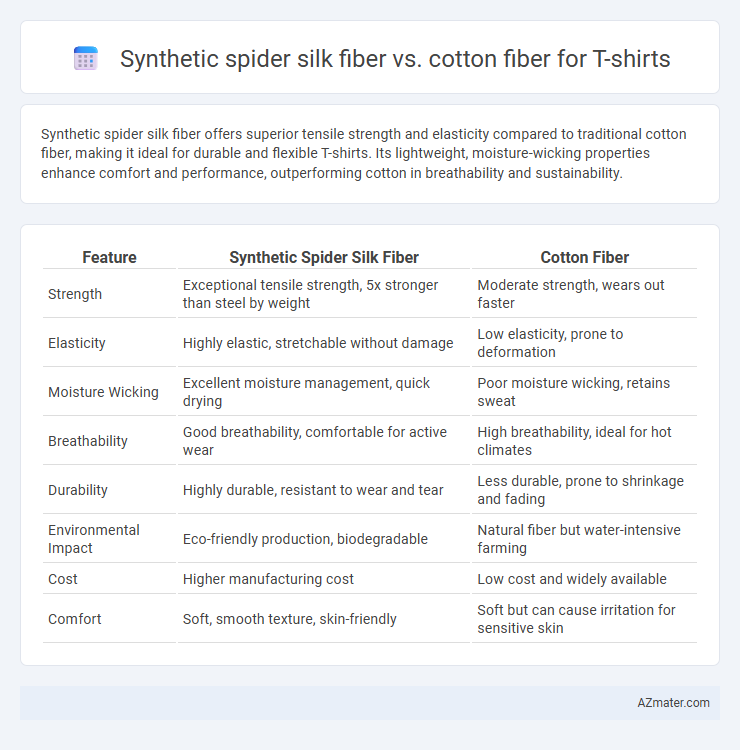Synthetic spider silk fiber offers superior tensile strength and elasticity compared to traditional cotton fiber, making it ideal for durable and flexible T-shirts. Its lightweight, moisture-wicking properties enhance comfort and performance, outperforming cotton in breathability and sustainability.
Table of Comparison
| Feature | Synthetic Spider Silk Fiber | Cotton Fiber |
|---|---|---|
| Strength | Exceptional tensile strength, 5x stronger than steel by weight | Moderate strength, wears out faster |
| Elasticity | Highly elastic, stretchable without damage | Low elasticity, prone to deformation |
| Moisture Wicking | Excellent moisture management, quick drying | Poor moisture wicking, retains sweat |
| Breathability | Good breathability, comfortable for active wear | High breathability, ideal for hot climates |
| Durability | Highly durable, resistant to wear and tear | Less durable, prone to shrinkage and fading |
| Environmental Impact | Eco-friendly production, biodegradable | Natural fiber but water-intensive farming |
| Cost | Higher manufacturing cost | Low cost and widely available |
| Comfort | Soft, smooth texture, skin-friendly | Soft but can cause irritation for sensitive skin |
Introduction: The Quest for Next-Gen T-Shirt Fibers
Synthetic spider silk fiber offers exceptional tensile strength and elasticity compared to traditional cotton fiber, making it a promising material for next-generation T-shirts. Its biodegradability and lightweight nature enhance wearer comfort while reducing environmental impact relative to conventional cotton cultivation, which demands high water and pesticide use. Innovations in synthetic spider silk production aim to address scalability challenges, positioning it as a superior alternative for durable, sustainable textile applications.
What is Synthetic Spider Silk Fiber?
Synthetic spider silk fiber is a bioengineered material designed to mimic the extraordinary strength, elasticity, and lightweight properties of natural spider silk, making it a superior alternative to traditional cotton fiber for T-shirts. Manufactured using recombinant DNA technology, synthetic spider silk offers exceptional durability, moisture-wicking capabilities, and biodegradability, which outperform cotton's tendency to shrink and wear out over time. This innovative fiber enhances comfort and sustainability in apparel, providing a high-performance fabric ideal for activewear and eco-conscious consumers.
Understanding Cotton Fiber: The Classic Choice
Cotton fiber, derived from the seed hairs of the cotton plant, is a natural cellulose fiber renowned for its softness, breathability, and moisture absorption, making it the classic choice for T-shirts. Its hypoallergenic properties and ease of dyeing contribute to vibrant colors and comfort in everyday wear. Compared to synthetic spider silk fiber, cotton offers a more familiar texture but may lack the enhanced strength and elasticity that synthetic fibers provide.
Sustainability: Environmental Impact Comparison
Synthetic spider silk fiber for T-shirts offers a sustainable alternative to cotton by significantly reducing water consumption and land use in production, as it is bioengineered rather than farmed. Cotton cultivation requires extensive water resources and pesticides, contributing to soil degradation and pollution, whereas synthetic spider silk fibers are produced using renewable feedstocks with a lower carbon footprint. This environmentally friendly manufacturing process leads to less chemical runoff and greenhouse gas emissions, making synthetic spider silk a more eco-conscious choice in textile sustainability.
Strength and Durability: Which Fiber Lasts Longer?
Synthetic spider silk fiber exhibits exceptional tensile strength and resilience, surpassing cotton fiber by a significant margin in durability and longevity. Its molecular structure allows it to withstand repeated stress and environmental factors without degrading, making it highly resistant to wear and tear. In contrast, cotton fiber tends to weaken and break down over time due to moisture absorption and friction, resulting in a shorter lifespan for cotton T-shirts compared to those made from synthetic spider silk.
Comfort and Wearability: How Do They Feel?
Synthetic spider silk fiber offers superior softness and a lightweight feel compared to cotton fiber, contributing to enhanced comfort for T-shirt wearers, especially in warm conditions. Its excellent moisture-wicking and breathability properties help regulate body temperature, reducing sweat accumulation and skin irritation often associated with traditional cotton. Cotton, while breathable and natural, tends to absorb moisture and can feel heavier when wet, impacting overall wearability during extended use or physical activity.
Moisture Management and Breathability
Synthetic spider silk fiber exhibits superior moisture management compared to cotton fiber, efficiently wicking sweat away from the skin to enhance dryness and comfort during physical activities. Its advanced breathability stems from micro-scale fiber structures that facilitate continuous air circulation, reducing overheating and improving thermal regulation. In contrast, cotton fiber absorbs moisture but tends to retain it, leading to slower drying times and diminished breathability under extended wear or high humidity conditions.
Production Costs and Scalability
Synthetic spider silk fiber production involves complex bioengineering techniques and currently incurs higher costs compared to traditional cotton fiber, which benefits from well-established agricultural practices and economies of scale. Cotton fiber scalability is supported by global cultivation and processing infrastructure, allowing for mass production at lower costs, whereas synthetic spider silk faces challenges in upscaling fermentation and spinning technologies. Advances in recombinant protein expression and bioreactor efficiency aim to reduce synthetic spider silk production expenses, potentially enabling competitive scalability for sustainable T-shirt manufacturing.
Future Prospects: Innovations and Market Potential
Synthetic spider silk fiber exhibits exceptional tensile strength, elasticity, and biodegradability compared to traditional cotton fiber, positioning it as a revolutionary material in the textile industry. Innovations in bioengineering and scalable production methods are accelerating the commercial viability of spider silk, promising enhanced performance and sustainability for future T-shirt fabrics. Market potential is substantial, driven by growing consumer demand for eco-friendly, high-performance apparel and the expanding adoption of advanced biomaterials in fashion.
Conclusion: Choosing Between Spider Silk and Cotton for T-Shirts
Synthetic spider silk fiber offers superior strength, elasticity, and moisture-wicking properties compared to traditional cotton fiber, making it ideal for high-performance and durable T-shirts. Cotton provides natural breathability, softness, and biodegradability, appealing to consumers prioritizing comfort and eco-friendliness. Selecting between synthetic spider silk and cotton depends on whether durability and advanced performance or natural comfort and sustainability are the primary priorities for the T-shirt.

Infographic: Synthetic spider silk fiber vs Cotton fiber for T-shirt
 azmater.com
azmater.com